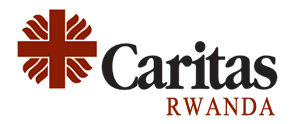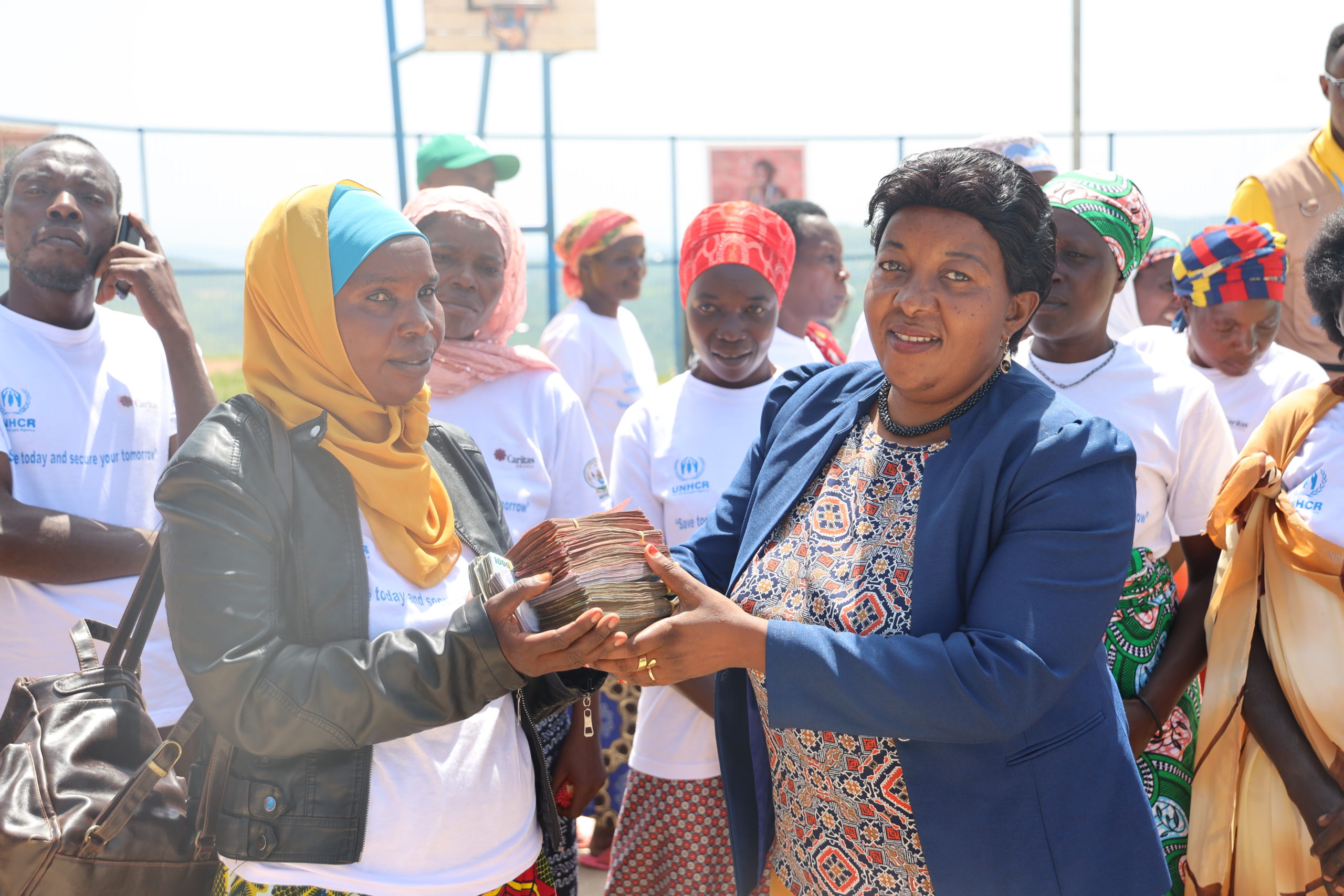Caritas Graduation Project celebrates the achievements of its beneficiaries in the Nyabiheke Refugee Camp
On May 31st, 2022, the UNHCR-funded ‘Caritas Graduation Project’ in Nyabiheke Refugee Camp organised a one-day mini exhibition to showcase the achievements of the project’s beneficiaries to partners and stakeholders. Hosted at the Nyabiheke basketball stadium, the event united over 150 people including Gatsibo district officials, UNHCR representatives, partner organisations, Caritas Rwanda staff and the project’s beneficiaries.
Aiming at tracking the project’s implementation progress from the year 2020 to the year 2022, the event’s audience witnessed the impact of Caritas Graduation project, through success storytelling and digital testimonials that were printed and exhibited at the venue.
The event was also an opportunity for the 8 Saving and Internal Lending Communities (SILC) at the Nyabiheke Refugee Camp and the host communities around the camp to conduct share out activities, which also marked the beginning of the second saving cycle that will extend to 12 months.
In his opening remarks, Mr. David Abimana, Nyabiheke Site Manager for the Caritas Graduation Project introduced the different objectives of the exhibition and expressed his gratitude to the project’s beneficiaries for their active contribution to improving livelihood in the Nyabiheke Refugee Camp.
In his testimony, Tuyiringire Innocent, Graduation Project beneficiary mentioned that his life has changed after being selected to be part of the project. He said: ’’When I was selected to join this project, I received intensive training, which sharpened my skills especially in managing a business. I then received a cash grant, which allowed me to buy a sewing machine and to start a small bar business’’:
Funded by UNHCR, Caritas Graduation Project is being implemented by Caritas Rwanda in Nyabiheke Refugee Camp and its hosting communities (Mugera cell, Nyabicwamba Cell and Gatsibo Cell). In line with the project’s main output which are: Increased livelihoods and economic opportunities, Caritas adopts the system of training the beneficiaries for behaviour change, for the better implementation of the beneficiaries’ income generating activities, as well as income saving through SILC groups.
Mungwakunzwe Richard, UNHCR Kabarore field unit livelihood and economic inclusion associate/BD, who is also in charge of livelihood in Nyabiheke Refugee Camp appreciated the idea and efforts invested to prepare this exhibition and emphasised on how livelihood activities have impacted beneficiaries and their living conditions to the point where refugees have now reached the working and saving levels that was witnessed during the exhibition. Speaking to the project’s beneficiaries, Mungwakunzwe advised:’’ Please use this money accordingly to continue helping your families’ needs and achieve self-sustainability. This should not only help you who are present here, it will as well support your families and will motivate other refugees to work hard and save for a better future”. He recognized Caritas Rwanda’s good work and experience in monitoring the activities of Caritas Graduation Project and reassured Caritas Rwanda of UNHCR’s continued support to the project’s mission.
Interacting with the project’s beneficiaries, Nyabiheke Deputy Camp Manager, Mr. Mbabazi Emmanuel emphasized on the fact that grants received through this project should be invested wisely, to generate more profit. He said” These grants that you have received are like seeds that a farmer sows in the land, which, after some period of time and good care, will yield good harvest.’’
The Government of Rwanda has been generously hosting refugees for over two decades and the Ministry in charge of Emergency Management (MINEMA) coordinates the refugee response with support from United Nations High Commissioners for Refugees (UNHCR), as well as providing land to establish refugee camps and ensuring camp management and security.
Uwimana Henriette, a project beneficiary attested: “I am very happy to be among the beneficiaries of Caritas Rwanda. I not only received training from this project, but also, I benefited from cash grants that were given to us, which allowed me to achieve my dream of selling kitenge fabrics. Through my SILC group, I will share more than RWF 300,000 today, which I will use to invest in my daughter’s business idea, right after she finishes her secondary school studies’’. Uwimana added.
Savings and Internal Lending Community (SILC) groups were created in the Nyabiheke Refugee Camp in June 2021, which is when Cohort 2 of the Graduation Project was launched.
The total amount saved by SILC members in cohort 2 is RWF 23,871,900, while total amount shared by 148 members is RWF 31,344,900, with the highest share being RWF 647,100 and the lowest being RWF 121,300.
The funds shared by beneficiaries after the saving cycles are used by beneficiaries to either increase investment capital for their existing income generating activities, to open secondary businesses.
In his remarks, Caritas Graduation Project Manager Jean D’ Amour Nsabiyaremye expressed his gratitude to all the guests, especially to the UNHCR for believing in Caritas Rwanda and availing necessary funds required to implement Caritas Graduation Project in different refugee camps. Nsabiyaremye also thanked MINEMA and all partners for their unfailing support and good collaboration that allows Caritas Rwanda to successfully implement this project and allow it to reach its objective of self-reliance for refugees. He reassured them of Caritas Rwanda’s absolute support especially through mentorship and coaching.
In her closing speech, Gatsibo District’s Director of Social Development , Mrs. DUSENGE Yvette highlighted the fact that foreign aid required to sustain refugees all around the world is expected to decrease, with the current economic challenges globally, which should encourage the project’s beneficiaries to invest their grants and savings wisely. ” This project is a good opportunity especially for refugees to work and improve their lives without having to rely on foreign aid.’’ Dusenge said.
Currently, the Government of Rwanda in coordination with UNHCR is implementing a strategy to assist beneficiaries with integration, however, as of now, beneficiaries (especially refugees) are still heavily reliant on the UNHCR, WFP and other agencies. It is in this perspective that UNHCR initiated the Graduation Project, as a pathway to economic inclusion and self-reliance of refugees and their hosting communities in Rwanda.
The exhibition ended with a get-together where guests, partners and beneficiaries shared refreshments., as they interacted.


